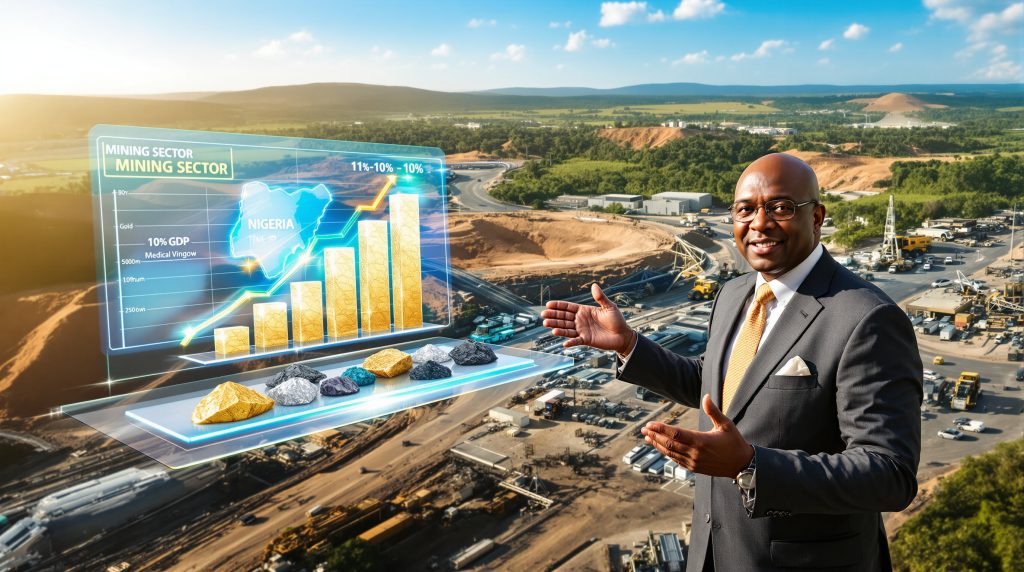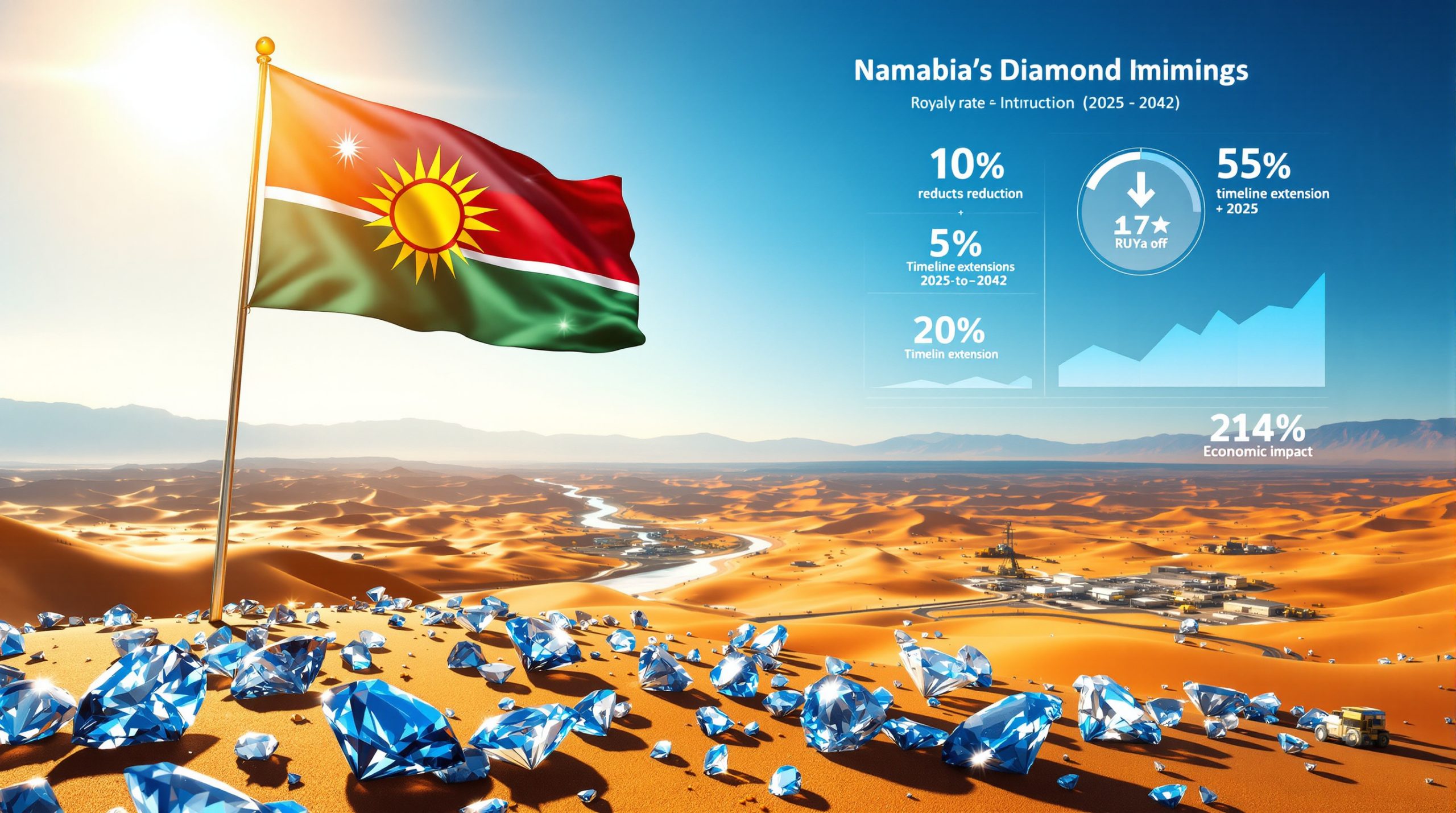Nigeria Mining Investment: Unlocking the Trillion-Naira Opportunity
Nigeria stands at a pivotal moment in its economic diversification journey, with the mining sector emerging as a cornerstone of its transformation strategy. The unprecedented commitment of ₦1 trillion to revitalize the mining industry signals a dramatic shift in national priorities and creates compelling opportunities for investors seeking exposure to one of Africa's most resource-rich yet underdeveloped mining jurisdictions.
The Scale of Nigeria's Mineral Wealth
Nigeria possesses vast deposits of over 44 commercially viable minerals distributed across its 36 states. These include industrial minerals like limestone, barite, and gypsum; energy minerals such as coal and uranium; metallic ores including iron, lead, and zinc; precious metals like gold; and critical minerals such as lithium and rare earth elements.
Despite this abundance, the sector currently contributes less than 1% to Nigeria's GDP, with only ₦401.879 million recorded in 2023. This stark contrast between potential and performance indicates significant growth opportunities for strategic investors interested in Nigeria mining investment.
How Is Nigeria Transforming Its Mining Sector?
The Nigerian government under President Bola Ahmed Tinubu has initiated the most ambitious mining industry evolution program in the country's history, with far-reaching implications for investors and the national economy.
Historic Investment Commitment
The allocation of ₦1 trillion specifically for mining development forms part of a wider ₦4.5 trillion allocation in the 2025 federal budget. This represents the largest investment in the country's mining history and demonstrates strong political will to develop the sector.
President Tinubu, speaking at the 10th Nigeria Mining Week in October 2025, described this investment as "going beyond mining" to represent "a strategic investment in jobs, industrialisation, and innovation—laying the foundation for a post-oil, globally competitive Nigeria."
Key Areas of Government Investment
The trillion-naira investment targets several critical areas:
- Nationwide geological mapping to improve data availability and accuracy
- Geoscientific exploration to quantify mineral reserves with international standards
- Infrastructure development to support mining operations in remote areas
- Technology integration through platforms like the Nigerian Mineral Resources Decision Support System (NMDRSS)
- Environmental protection frameworks and sustainable mining practices
Regulatory Reforms and Policy Improvements
Significant regulatory reforms are being implemented to create a more attractive investment environment:
- Comprehensive review of the Mining Act 2007 to align with global best practices
- Revocation of inactive licenses to free up promising mineral areas for serious investors
- Strategic crackdown on corruption and mineral theft to protect legitimate operators
- Streamlining of bureaucratic processes to reduce delays and inefficiencies
- Establishment of the Nigeria Solid Minerals Company to attract private capital
Permanent Secretary of the Ministry of Solid Minerals Development, Faruk Yabo, has acknowledged ongoing challenges, noting that "issues such as policy overlaps, bureaucratic delays, and multiple taxation continue to hinder investment." However, the ministry has implemented decisive actions to address these barriers, including expanded roles for oversight bodies like the Nigerian Audit and Integrity Team (NAIT).
What Makes Nigeria an Attractive Mining Investment Destination?
Nigeria offers several compelling advantages for mining investors, particularly in the context of growing global demand for critical minerals.
Mineral Diversity and Global Demand Alignment
Nigeria's mineral portfolio aligns perfectly with global market demands:
- Battery minerals: Lithium, cobalt, and graphite deposits position Nigeria to participate in the electric vehicle supply chain
- Industrial minerals: Essential inputs for construction and manufacturing, with proximity to major markets
- Precious metals: Gold deposits offer hedge value during economic uncertainty, with recent gold price analysis showing favorable trends
- Agricultural minerals: Phosphates and potash resources support food security initiatives
Yabo has emphasized that "the global energy transition presents a transformative opportunity. With minerals critical to solar and green technologies, Nigeria can place solid minerals at the centre of a new economic era."
Economic Indicators and Growth Trajectory
The sector is showing promising signs of growth:
- Revenue increase: From ₦6 billion in 2023 to over ₦38 billion in 2024, representing a 533% increase
- Foreign direct investment: Growing interest from international mining companies seeking early-mover advantage
- Value addition opportunities: Emerging processing and refining capabilities to capture more of the value chain
Competitive Advantages
Nigeria offers several distinct advantages as a mining investment destination:
- Large domestic market: Africa's largest economy with 200+ million consumers
- Strategic location: Proximity to European and American markets with established shipping routes
- Improving infrastructure: Ongoing investments in power, roads, and rail networks
- Available workforce: Young, growing population with increasing technical skills
- Political stability: Democratic governance with improving institutional frameworks
What Investment Models Are Available in Nigeria's Mining Sector?
Investors can participate in Nigeria's mining renaissance through various channels, each offering different risk-reward profiles.
Direct Investment Options
The sector offers multiple entry points for different investor profiles:
- Greenfield exploration projects: Securing mineral rights for unexplored areas with high discovery potential
- Brownfield development: Investing in existing operations with expansion potential and lower technical risk
- Joint ventures: Partnering with local companies or government entities to share expertise and risk
- Service provision: Supplying equipment, technology, or expertise to mining operations
- Mineral processing facilities: Establishing value-addition operations to process locally mined materials
The Solid Minerals Development Fund Model
A notable development is the role of the Solid Minerals Development Fund (SMDF) in facilitating mining investments:
- Provides co-funding for commercial-scale mining projects to reduce capital barriers
- Addresses technical risks through shared expertise and resources
- Targets strategic minerals including precious metals and energy transition materials
- Offers a blueprint for public-private collaboration in the sector
The establishment of the Nigeria Solid Minerals Company further enhances investment options by creating a vehicle specifically designed "to attract private capital and boost local processing," according to President Tinubu.
Investment Incentives
The Nigerian government offers attractive incentives to mining investors:
- Tax holidays: 3-5 years for qualifying projects to enhance early profitability
- Duty exemptions: On imported mining equipment to reduce capital costs
- Foreign ownership: 100% foreign ownership permitted in most mining subsectors
- Capital repatriation guarantees: Freedom to repatriate profits and dividends
- Dedicated support: Through specialized investment facilitation initiatives
What Challenges Must Investors Navigate?
Despite significant improvements in Nigeria's mining investment climate, several challenges require careful management by investors.
Infrastructure Gaps
Infrastructure limitations remain in some mining regions:
- Power supply: Inconsistent electricity access in remote mining areas necessitates self-generation
- Transportation networks: Limited rail capacity for bulk mineral movement increases logistics costs
- Water management: Challenges in securing sustainable water sources in certain regions
- Digital connectivity: Communication limitations affecting operational efficiency
Security Considerations
Security remains a consideration in some mining regions:
- Regional variations: Security situations differ significantly across states, requiring location-specific strategies
- Community relations: Critical importance of building strong social license to operate
- Artisanal mining conflicts: Potential tensions with informal miners require formalization approaches
- Resource governance: Ensuring fair distribution of benefits to minimize conflicts
Regulatory and Operational Hurdles
Investors must navigate several operational challenges:
- Multiple taxation: Overlapping federal, state, and local government levies despite reform efforts
- Bureaucratic processes: Administrative delays in permitting and approvals
- Technical expertise gaps: Limited local specialized mining skills requiring training investments
- Environmental compliance: Meeting evolving sustainability standards and community expectations
How Can Investors Maximize Success in Nigeria's Mining Sector?
Successful mining investment in Nigeria requires thoughtful strategies that address both opportunities and challenges.
Strategic Approaches for Foreign Investors
Experience shows that successful investment strategies typically include:
- Thorough due diligence: Comprehensive assessment of mineral assets, legal status, and environmental factors
- Strong local partnerships: Collaboration with reputable Nigerian entities for navigating local contexts
- Community engagement: Early and meaningful stakeholder involvement to secure social license
- Phased development: Staged approach to project implementation to manage capital risk
- Integrated value chain: Considering downstream processing opportunities for higher returns
Faruk Yabo emphasized the importance of "collaboration between government, industry, and communities to convert potential into tangible national prosperity," noting that coordinated approaches yield the best results.
Leveraging Technology and Transparency Tools
Investors can utilize new technology platforms to enhance decision-making:
- Nigerian Mineral Resources Decision Support System (NMDRSS): Provides real-time data for improved transparency and investor confidence
- Mining Cadastre digitalization: Streamlines mineral title applications and management
- Nigerian Audit and Integrity Team (NAIT): Ensures financial accountability and compliance tracking
- Remote sensing technologies: Enables efficient exploration and environmental monitoring
Future-Focused Investment Strategies
Forward-thinking investors are positioning for emerging opportunities:
- Energy transition minerals: Securing lithium and other battery materials ahead of demand surges
- Digital mining technologies: Implementing IoT, AI, and mining technology innovation to overcome skills gaps
- Sustainable mining practices: Adopting ESG-compliant operations to meet global standards
- Integrated development models: Creating mining-centered industrial hubs for maximum economic impact
What Is the Long-Term Outlook for Nigeria's Mining Sector?
The transformational investment and policy reforms underway suggest a promising future for Nigeria's mining industry.
Growth Projections
Industry analysts project significant sector growth:
- GDP contribution target: From less than 1% currently to 5-10% within a decade
- Employment generation: Potential to create over 500,000 direct and indirect jobs
- Export diversification: Reducing dependence on oil revenues for foreign exchange
- Industrial development: Catalyst for manufacturing growth through mineral inputs
Strategic Minerals Focus
The government has prioritized development of:
- Gold: Formalization of artisanal mining and development of commercial-scale operations
- Lithium: Positioning Nigeria in the global battery supply chain with processing capabilities
- Iron ore: Supporting domestic steel production for infrastructure development
- Barite: Achieving self-sufficiency for the oil and gas industry to reduce imports
- Coal: Clean coal technology for power generation in energy-deficient regions
Vision for Sustainable Development
The long-term vision emphasizes:
- Local beneficiation: Moving beyond raw material exports to capture more value through mineral beneficiation insights
- Technology transfer: Building domestic technical capabilities through partnerships
- Environmental stewardship: Responsible resource management with rehabilitation plans
- Community prosperity: Ensuring mining benefits local populations through integrated development
President Tinubu has called for "unity among government, investors, and host communities to make mining a major GDP contributor," emphasizing that "Nigeria must become a continental model for sustainable, inclusive development."
How to Begin Investing in Nigeria's Mining Sector?
For investors interested in exploring Nigeria's mining opportunities, several pathways exist for market entry.
Entry Pathways
Prospective investors can enter the market through several channels:
- Mining cadastre system: Direct application for mineral titles through the Mining Cadastre Office
- Acquisition of existing assets: Purchasing stakes in operating projects to reduce development timeline
- Strategic partnerships: Joint ventures with established players to combine strengths
- Investment funds: Participation through specialized mining funds focused on Nigerian assets
Key Government Touchpoints
Essential government touchpoints include:
- Ministry of Solid Minerals Development: Primary regulatory authority overseeing the sector
- Nigerian Investment Promotion Commission: Investment facilitation and incentive coordination
- Mining Cadastre Office: Mineral title administration and management
- Nigerian Geological Survey Agency: Geological data and information resources
- Solid Minerals Development Fund: Funding and financial support mechanisms
Due Diligence Checklist
Critical assessment areas include:
- Title verification: Confirming mineral rights validity and encumbrances
- Resource validation: Independent verification of mineral estimates using international standards
- Environmental compliance: Assessment of environmental liabilities and regulatory requirements
- Community relations: Understanding local stakeholder dynamics and expectations
- Infrastructure access: Evaluating logistical feasibility and connection to markets
FAQs About Nigeria Mining Investment
What minerals offer the best investment opportunities in Nigeria?
Nigeria's most promising mineral investment opportunities include lithium for battery production, gold for its stable value, limestone for cement manufacturing, and iron ore for steel production. Critical minerals supporting the global energy transition, such as tantalum and rare earth elements, also present significant potential due to increasing global demand and limited supply sources as highlighted in the government's critical minerals strategy.
How does Nigeria's mining fiscal regime compare to other African countries?
Nigeria offers one of Africa's more competitive mining fiscal regimes, featuring 3-5 year tax holidays, duty exemptions on equipment imports, and 100% foreign ownership allowances. While royalty rates vary by mineral (typically 3-5%), they remain competitive with regional standards. The government has also streamlined the tax structure to reduce the burden of multiple taxation that previously challenged investors.
What is the typical timeline for obtaining mining licenses in Nigeria?
The licensing process through Nigeria's Mining Cadastre Office typically takes 30-90 days for exploration licenses and 60-120 days for mining leases, assuming all documentation is complete. Recent digitalization efforts have improved efficiency, though complex projects may require additional time for environmental approvals. The government has committed to further streamlining these processes as part of its sector reforms.
How is Nigeria addressing illegal mining and security concerns?
Nigeria has implemented a multi-faceted approach to combat illegal mining, including specialized enforcement units, formalization programs for artisanal miners, and satellite monitoring of mining sites. The government has also established mining police and strengthened collaboration between security agencies to protect legitimate operations. Community engagement programs aim to address root causes by creating alternative economic opportunities.
What infrastructure improvements are planned to support mining development?
The government's infrastructure development plan includes dedicated power solutions for mining clusters, rehabilitation of the national rail network to facilitate mineral transportation, and water management systems for sustainable operations. Special Mining Zones with pre-developed infrastructure are being established to reduce upfront costs for investors and accelerate project development timelines.
Future Perspectives on Nigeria's Mining Potential
The historic ₦1 trillion investment in Nigeria's mining sector represents a watershed moment for the industry's development. As Permanent Secretary Yabo noted, "Now is the time to move from possibilities to impact—turning our mineral wealth into real national wealth."
For investors willing to navigate the challenges, Nigeria mining investment offers a rare combination of untapped mineral wealth, improving governance, strategic location, and strong government commitment. The success of this ambitious transformation will depend on continued reforms, effective implementation of new technologies, and genuine partnerships between government, investors, and communities.
With appropriate strategies and a long-term perspective, investors can play a significant role in Nigeria's mining renaissance while positioning themselves in one of Africa's most promising resource frontiers.
Interested in Finding the Next Major Mineral Discovery?
Stay ahead of the market with real-time alerts on significant ASX mineral discoveries through Discovery Alert's proprietary Discovery IQ model, turning complex mineral data into actionable investment insights. Discover why major mineral discoveries can lead to substantial returns by visiting the Discovery Alert discoveries page and begin your 30-day free trial today.




